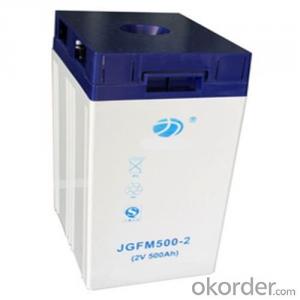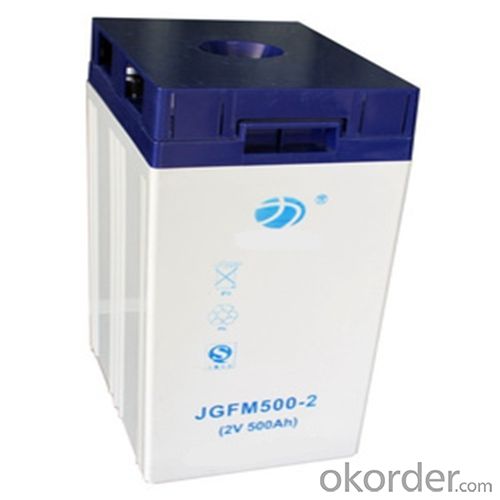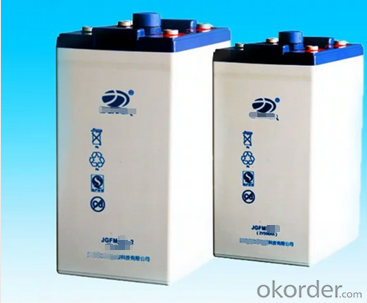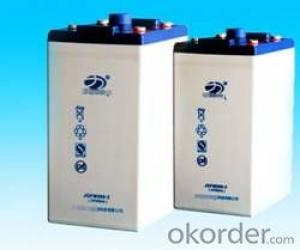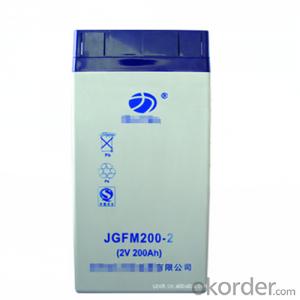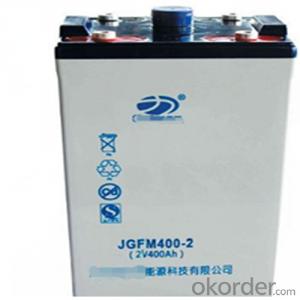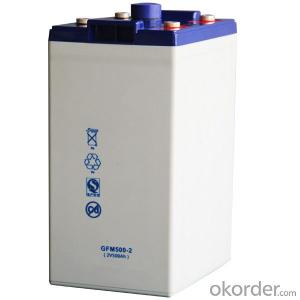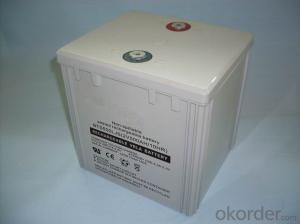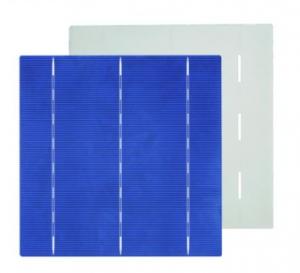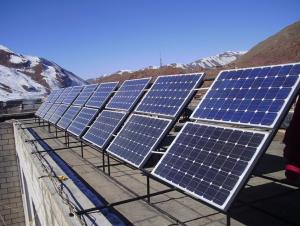Crystalline Silicon Solar Cells Compatible Colloid Storage Battery JGFM Series 2V 500AH
- Loading Port:
- China main port
- Payment Terms:
- TT OR LC
- Min Order Qty:
- 1 pc
- Supply Capability:
- 10000000 pc/month
OKorder Service Pledge
OKorder Financial Service
You Might Also Like
Structure of Product Descrtiption
What is the product?
· Precision explosion relief valve shall be adopted
· Designed life is fifteen years,excellent performance of battery in low temperature and superiority in consistence and stability
· Can be used at vertical or horizontal orientation
· Low self-discharge rate and long shelf life
· Design with patented corrosion resisting alloy and thickened plate
What is the purpose of the product?
· Data Centre (High Rate UPS)
· Banks & Financial Centre
· Hospital& Testing Laboratories
· Power Generation Plants
· Design with patented corrosion resisting alloy and thickened plate
What advantages do products have ?
· Stable quality&high reliability
· Sealed construction
· Maintenance-free operation
· Low pressure venting system
· Heavy duty grid
· Low self discharge
Main feature of the product:
*safety and reliable
*environmental friendly and fast delivery
*low self diacharge
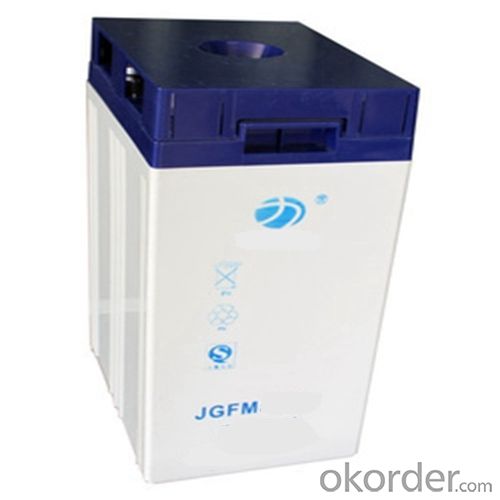
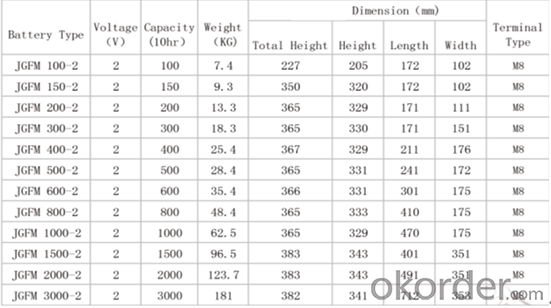
FAQ:
1. What’s price per watt?
A: It’s depends on the quantity, delivery date and payment terms of the order. We can talk further about the detail price issue. Our products is high quality with lower price level.
2. What payment do you have?
We have CIF,FOB,DDU,DDP,CFR so and .It all depends.
3. How do you pack the products?
We have rich experience on how to pack the panels to make sure the safety on shipment when it arrives at the destination.
- Q: Are there any health risks associated with solar cells?
- There are no direct health risks associated with solar cells themselves. However, the manufacturing process of solar cells involves the use of certain chemicals and materials that can be harmful if not handled properly. Additionally, improper installation or maintenance of solar panels can pose electrical and fire hazards. Thus, it is important to ensure proper safety measures are followed during production, installation, and maintenance to minimize any potential health risks.
- Q: Can solar cells be used on mobile devices?
- Yes, solar cells can be used on mobile devices. In fact, there are already solar-powered chargers available that can be attached to mobile devices to harness solar energy and charge them on the go. These solar cells convert sunlight into electricity, providing a sustainable and eco-friendly source of power for mobile devices.
- Q: What is the environmental impact of solar cells?
- The environmental impact of solar cells is generally positive. They produce clean and renewable energy, reducing greenhouse gas emissions and dependence on fossil fuels. However, their production does require some raw materials and energy, which can have environmental consequences. Additionally, the disposal of older solar panels may pose challenges in terms of electronic waste management. Overall, though, the benefits of solar cells outweigh their environmental drawbacks.
- Q: Can solar cells be damaged by hail or other weather conditions?
- Yes, solar cells can be damaged by hail or other severe weather conditions. Hailstones can cause physical damage to the surface of solar panels, resulting in cracks or fractures that may affect their efficiency. Additionally, extreme weather events such as heavy rain, strong winds, or lightning storms can potentially cause electrical and structural damage to solar cell systems. Hence, it is important to consider the durability and resilience of solar panels when installing them in areas prone to such weather conditions.
- Q: How to get high voltage, high current output of solar cells
- Series can increase the output voltage, parallel can provide output current. Using a series parallel method to achieve, for example: need 220 volts 10 amps.
- Q: How do solar cells perform in dry desert conditions?
- Solar cells perform exceptionally well in dry desert conditions. The intense sunlight and lack of humidity in desert environments create optimal conditions for the generation of solar energy. The absence of clouds and minimal air pollution allows solar cells to efficiently convert sunlight into electricity, resulting in higher energy output. Additionally, the heat in desert regions can increase the efficiency of solar cells, as their performance typically improves with higher temperatures. Therefore, solar cells are highly effective and efficient in dry desert conditions.
- Q: Can solar cells be used in underwater vehicles?
- Yes, solar cells can be used in underwater vehicles. However, due to the limited availability of sunlight underwater, the efficiency of solar cells is significantly reduced compared to their performance on the surface. Therefore, other power sources such as batteries or fuel cells are often used in conjunction with solar cells to provide continuous power to underwater vehicles.
- Q: Can solar cells be used in agricultural settings?
- Yes, solar cells can be used in agricultural settings. They can be used to power irrigation systems, electric fences, and other equipment used in farming. Additionally, solar panels can be installed on agricultural buildings or land to generate electricity, reducing the reliance on grid power.
- Q: How to manufacture solar cells?
- It's a bit difficult to describe.
- Q: Can solar cells be used in cloudy weather?
- Yes, solar cells can still generate electricity in cloudy weather. While the efficiency of solar cells decreases in low light conditions, they can still capture and convert sunlight into usable energy. However, the amount of electricity produced may be lower compared to sunny conditions.
Send your message to us
Crystalline Silicon Solar Cells Compatible Colloid Storage Battery JGFM Series 2V 500AH
- Loading Port:
- China main port
- Payment Terms:
- TT OR LC
- Min Order Qty:
- 1 pc
- Supply Capability:
- 10000000 pc/month
OKorder Service Pledge
OKorder Financial Service
Similar products
Hot products
Hot Searches
Related keywords
